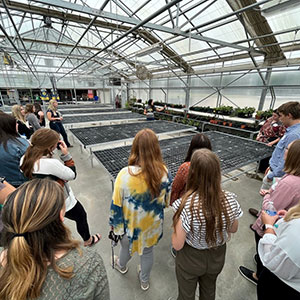Agricultural Education Option

Studying Ag Ed Teaching at UNL - What You Will Learn?
The Agricultural Education option emphasizes interpersonal communication and leadership theory, a breadth of required agricultural science and natural resource course work, and field experiences to reinforce classroom learning.
Completion of the teaching option program provides professional endorsement and certification to teach agricultural education 6-12 in secondary educational institutions. It supports excellent mobility for employment with 225 positions statewide as well as over 10,000 nationally.
Should teaching not be an immediate decision, the program provides outstanding preparation to enter extension education or the service sector of the agribusiness industry ultimately opening the door to post-secondary teaching.
The UNL Difference
 We are internationally recognized as a Land-Grant College of Agricultural Sciences and Natural Resources. Our department's foundation is in teacher education providing experiential education which is prevalent throughout the coursework. There is a focus within the department on leadership development , and an emphasis on teaching competence, i.e., teach to the learner in the context the learner will use the information.
We are internationally recognized as a Land-Grant College of Agricultural Sciences and Natural Resources. Our department's foundation is in teacher education providing experiential education which is prevalent throughout the coursework. There is a focus within the department on leadership development , and an emphasis on teaching competence, i.e., teach to the learner in the context the learner will use the information.
Applied teaching with numerous field experiences beginning the first semester and continuing until graduation, and a breadth of technical agricultural coursework is included to provide exposure to the diversity of the industry. We have relevant internship and student teaching opportunities throughout the state, nation, and world, with specialized courses that provide students with opportunities to enhance human relations and leadership skills.
Students can interact with students in specialized organizations in this and related fields as well as a wide variety of other groups and co-curricular activities.
The department is also the only source for endorsement preparation to teach secondary agricultural education in Nebraska.
Facilities
The classroom includes the real world. Students utilize on and off campus facilities as their learning laboratories. The department is connected to the field's practitioners. All forms of technology are utilized throughout the program's option.
| College: | College of Agricultural Sciences & Natural Resources |
|---|---|
| Degree | Bachelor of Science in Agricultural Leadership, Education and Communication |
| Hours Required | 120 |
| Minor Available | No |
Transfer Programs
In addition to the UNL Four Year Program, transfer programs are offered to provide an opportunity to benefit from different educational institutions in the state of Nebraska while still achieving a Bachelor of Science degree in Agricultural Education from UNL.
Transfer ProgramsWhat You'll Learn
Graduates of agricultural leadership, education and communication – Teaching Option will be able to:
- Understand the central concepts, tools of inquiry, and structures of the disciplines he or she teaches and can create learning experiences that make these aspects of subject matter meaningful for students.
- Understand how children learn and develop and can provide learning opportunities that support their intellectual, social, and personal development.
- Understand how students differ in their approaches to learning and create instructional opportunities that are adapted to diverse learners.
Read More
- Understand and use a variety of instructional strategies to encourage student’s development of critical thinking, problem solving, and performance skills.
- Use an understanding of individual and group motivation and behavior to create a learning environment that encourages positive social interaction, active engagement in learning, and self-motivation.
- Use knowledge of effective verbal, nonverbal, and media communication techniques to foster active inquiry, collaboration, and supportive interaction in the classroom.
- Plan instruction based upon knowledge of subject manner, students, the community, and curriculum goals.
- Understand and use formal and informal assessment strategies to evaluate and ensure the continuous intellectual, social, and physical development of the learner.
- Be a reflective practitioner who continually evaluates the effects of his/her choices and actions on others (students, parents and other professionals in the learning community) and who actively seeks out opportunities to grow professionally.
- Foster relationships with school colleagues, parents, and agencies in the larger community to support students’ learning and well-being.
Career Outlook
- Teach Agricultural Education 6-12 in Secondary Educational Institutions
- Extension Education
- Agribusiness Industry